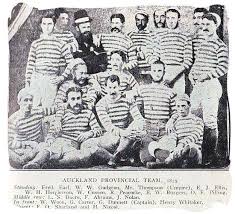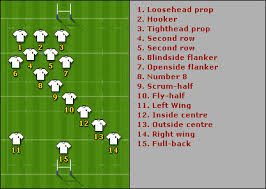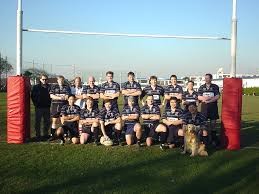The sport of Rugby is often referred to as the "father" of American football. Rugby started at least 70 years before American football and football evolved with many of the same principles, strategies and tactics. However, there are several obvious differences.
Rugby is played at a fast pace, with few stoppages and continuous possession changes. All players on the field, regardless of position, must be able to run, pass, kick and catch the ball. Likewise, All players must also be able to tackle and defend, making each position both offensive and defensive in nature. There is no blocking of the opponents like in football, and there are only five substitutions per game allowed for each team. A rugby match consists of two 40-minute halves.
Rugby is played on a field, called a pitch, that is longer and wider than a football field, more like a soccer field. A typical pitch is 100 meters (110 yards) long 70 meters (75 yards) wide. Additionally, there are 10-22 meter end zones, called the in-goal area, behind the goalposts. The goalposts are 'H'-shaped cross bars located on the goal line.
THE BALL
The rugby ball is made of leather material that is easy to grip and does not have laces. Rugby balls are made in varying sizes (3, 4 or 5). Like footballs, rugby balls are oval in shape.
PLAYERS & POSITIONS
A rugby team has 15 players on the field of play. In rugby each team is numbered the exact same way. The number of each player signifies that player's position. Players numbered 1-8 are forwards, who are typically the larger, stronger players of the team whose main job is to win possession of the ball. These players are similar in size and abilities as American football linebackers and lineman. Players numbered 9-15 are backs, who tend to be the smaller, faster and more agile players. Their main role is to exploit possession of the ball that is won by the forwards, similar to the roles of American football's running backs, wide receivers and quarterbacks.
STARTING THE GAME
Just like in American football, rugby is started with a kickoff to the opponent from mid-field. Provided that the ball travels beyond the 10 meter line, any player of either team may gain possession of the ball.
MOVING THE BALL
There is no blocking in rugby. Rugby does not have downs, and a team is not required to reach 10 yards and stop. The person with the ball leads the attack. In rugby there are several ways to move the ball. Any player may carry, pass or kick the ball. Play is not stopped and continues when the ball hits the ground or when a player is tackled. The ball carrier must release the ball when tackled and roll out of the way so that other players on their feet can play the ball.
Running: When running the ball, players may continue to run until they are tackled, step out of bounds or run beyond the goal line. Players run the ball to advance toward the opponent's goal line.
Passing: The ball may be passed to any other player. However, it may only be passed laterally or backward, never forward. Players pass the ball to an open teammate to keep it in play and further advance it.
Kicking: Any player may kick the ball forward at any time. Once the ball is kicked, players of either team, regardless of whether or not the ball hits the ground, may gain possession. Players typically kick the ball to a teammate in an effort to advance it or to the opposing team to obtain relief from poor field position.
SCORING
There are four ways for a team to score points:
Try: Five points are awarded to a team for touching the ball down in the other team's in-goal area. This is much like a touchdown in American football.
Conversion: Following a try, two points are awarded for a successful kick through the goal posts. The attempt is taken on a line, at least 10 meters, straight out from the point where the ball was touched down.
Penalty Kick: Following a major law violation, the kicking team, if in range, has the option to "kick for points." Three points are awarded for a successful penalty kick. The kick must be from the point of the foul or anywhere on a line straight behind that point.
Drop Goal: Three points are awarded for a successful drop kick. A drop kick may be taken from anywhere on the field at any time during play. A drop goal is similar to a field goal in football, however, in rugby the kick is made during the course of normal play. The ball is alive if the kick fails.
RESTARTING PLAY
There are two methods of restarting play following a stoppage caused by either the ball going out of bounds or because of an infraction of the laws.
Line-Out: If the ball goes out of bounds, it is restarted with a Line-Out. Both teams form a line perpendicular to the touchline and 1-meter (3 feet) apart from one another. A player of the team not responsible for the ball going out of bounds calls a play and throws the ball in the air in a straight line between the two lines. Players of each team may be supported in the air by their teammates as they jump to gain possession of the ball.
OFFSIDE LAW
Probably one of the more challenging aspects about rugby for the first time observer is the offside law. Like soccer, the offside line is continually moving up and down the pitch in rugby and varies according to the aspect of play. In general play, the ball creates the offside line and players are not permitted to participate in play if they are on the opposing teams side of the ball. Simply being offside is not a penalty, but attempting to participate in the game from an offside position is. In the line outs previously discussed, the offside lines are 10 meters back on either side from a line drawn across the field from where the ball is thrown in. At a scrum the offside lines are drawn across the field through the feet of the last person in each team's scrum.
TACKLES, RUCKS AND MAULS
Players in possession of and carrying the ball may be stopped by being tackled by the opposing team. Players are tackled around the waist and legs and, in general, may not be tackled higher. Once a player is tackled, however, play does not stop. The player must release the ball and roll away from it to allow other players on their feet play the ball.
A player who is tackled to the ground must try to make the ball available immediately so that play can continue. Supporting players from both teams converge over the ball on the ground, binding with each other and attempt to push the opposing players backwards in a manner similar to a scrum. The ball may not be picked up by any player, until the ball emerges out of the ruck. The ruck ends and play continues. A team that can retain possession after the tackle and the ensuing ruck has a huge advantage, because a ruck forms offside lines. These offside lines are the same as in the scrum and everyone must get back on sides in order to rejoin play.
A Maul is formed with a similar gathering of players, except the player in possession of the ball is not brought to the ground (not tackled) but it held up by an opponent and one his/her own players converge on him/her. This creates offside lines through the feet of the last players on each side. Players from each team must retreat behind these offside lines if they are to take part in any subsequent play. The maul ends when the ball emerges.
Drop kick: A kick made when the player drops the ball and it bounces off the ground prior to being kicked. Worth three points if it travels through the goalposts. Drop kicks are also used to restart play after a score.
Forward pass: A violation that usually results in a scrum to the defending team.
Infringement: A violation of a law.
Non-Contact Rugby: A Version of rugby designated to introduce the game to first time players (touch rugby). Two hand-tag replaces the tackle.
Tap and play kick/ move: A gentle kick to oneself, followed by a pick up, used to restart play after either a penalty or free kick is awarded.
Touchline: The side boundary of the field (sideline).
Try line: The end boundary of the field (goal line).































































